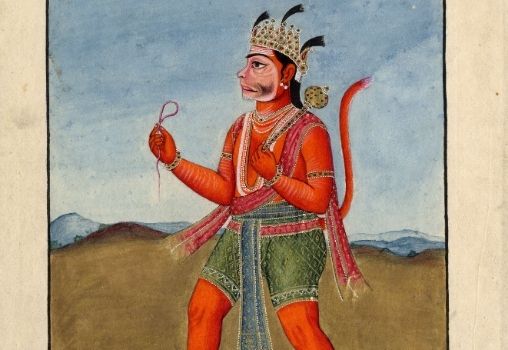Bali, King of Kishkindhya, was a warrior without peer. By Brahma’s boon, he could assimilate half his opponents’ strength, render him invincible. Raavan challenged him once and ended up squeezed and suffocated in Bali’s armpit for a large number of years. He kept his people in peace and prosperity, slew demons and evil spirits, and married Tara, fathered Angad. Understandably, he was proud of himself and sealed his doom.
When Mayabi-Rakshas (sorceror demon) challenged Bali by screaming outside his private rooms, he stormed out, chased his quarry to a cave in the earth. He told his brother, Sugreev, to guard the entrance and let no one pass. He then entered the dark cave system alone to battle Mayabi-Rakshas. Faithful Sugreev waited at the entrance for a year, but all was quiet beneath the earth. Then he heard rumblings, and blood welled up from the cave. He feared the worst and mourning his brother, sealed off the entrance with giant boulders and went back to Kishkindhya.
Bali was not dead, and when he returned, victorious Sugreev was sitting on the throne as king, and making pious noises about the memory of Bali. He threw himself on his face down before Bali and abdicated the crown, but Bali was not content. He chased Sugreev all over the world before Sugreev ran into a taboo zone for Bali. He then returned to his throne and started removing Sugreev’s supporters from the mortal plane. This is what Sugreev said to Rama on Mount Rishyamukh. Rama promptly shot an arrow through seven trees and convinced Sugreev to challenge Bali out of his fortress and ambush him.
After mortally injuring Bali on the second attempt — Bali had beaten Sugreev to a pulp in the first encounter — Bali castigated Rama for ambushing him, stating he could have retrieved Sita tomorrow, and his death was by foul and dishonourable means. He lamented that Tara had had premonitions of danger, but he trusted Rama’s honour and believed the murder of one king by another was a violation of civilised social custom.
Rama presented his justification for this assassination. First was Bali having taken to bed his brother’s wife Ruma, committed incestuous sex, contrary to Vedic laws that carried the death penalty. The second was he had promised Sugreev to retrieve his throne, and bound by word to his vassal, had to shoot Bali in the back. Lastly, Rama called Bali a sakhamrigo (tree deer) and stated hunting deer by stealth, ambush, camouflage, snare, trap, or pitfall is legal, meat enjoyed by sages.
This entirely convinced Bali, who, when Sugreev temporarily grew a conscience and melted into tears, comforted him, instructed Angad to follow Rama and died without fuss. Tara lamented Rama showed no sign of repentance, most wrong of him. Sugreev took the throne and started ruling Kiskindhya, promised to raise legions after monsoon ended. He didn’t appear, and Lakshman went in high dudgeon to remind him of obligation.
Lakshman met Tara at Kishkindhya gates, Bali’s widow, Sugreev’s current favourite lover, lately sharing a bed with him and Ruma. She was slow from pleasure, bent by the weight of breasts, thin of the waist, had bouncing buttocks, and directed sultry eyes at Lakshman, who only wanted to know about armies and mobilisation. She excused Sugreev, pleaded it had been a long time since poor monkey had had any pleasure, and lost track of time in unceasing sex. After Sugreev set about mustering armies, this minor hiccup, and the original reason for murdering Bali was forgotten. Sugreev, after all, was just a monkey, prone to barbarism.
This treatment is meted out to Dalits and Adivasis interminably daily by “Aryan” exploiters. Bonded labour, unsustainably used resources, environmental disasters, forceful eviction, intimidation by threat of rape and assault, unlawful arrest, torture, civil rights denial, village burning, imprisonment in concentration camps and gang rape characterise tactics. Sanctified murder for “greater good”, double standards, unashamed hypocrisy, arrogant justification, and ruthless opportunism handed down from Ramayana.

